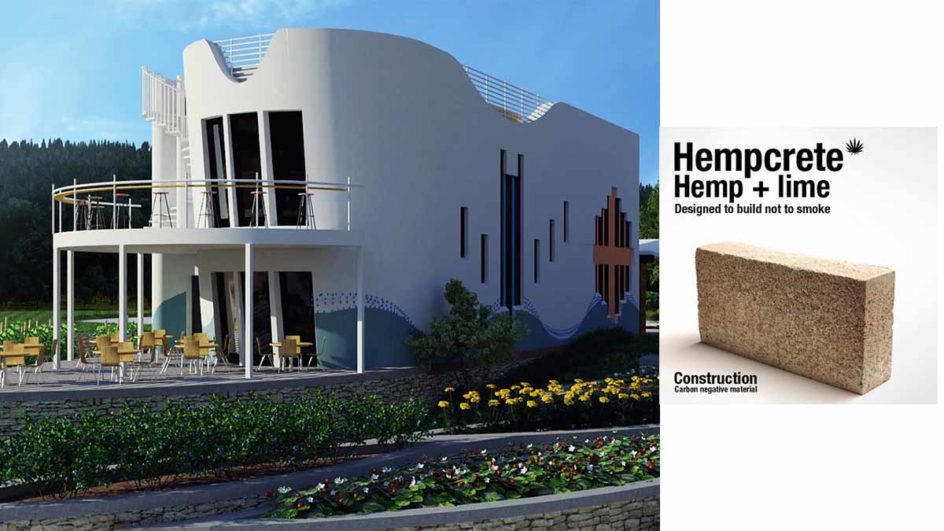With the rise of alternative sources of energy, building materials, and other renewables, many people are actively looking for more natural and healthy ways to create dwellings and live in the most sustainable way possible. One of the most exciting and eco-friendly products is an all natural building material called hempcrete, a biocomposite made from harvesting the woody stalks and centers, or hurds, of the industrial hemp plant and mixing it with lime (powdered limestone) and water.

Benefits of Hempcrete
Lime is used because it acts as a binder, enabling it to be formed, molded, and set in various ways that are all conducive to building. Hemp is known for its high silica content, which helps it bind to the lime, resulting in a cement-like material that insulates completely and is extremely lightweight, weighing only a fraction of traditional concrete. They are so light that, when formed into blocks, they will float when placed in water!
Its roots date as far back as the sixth century when it was first discovered in an old bridge in France, making it a highly substantial and very reliable building material. In addition to using it as a structural component, hempcrete is also used as a form of insulation and has been installed in many timber stud framed homes throughout Europe.
When installed and cast properly, hemp is mold, pest, and fire resistant. It creates less waste than some more traditional building materials, has an extremely high high R-Value, and because it is plant matter, it captures carbon dioxide (CO2) from the air and gives off oxygen (O2), aiding with indoor air quality throughout the structure. It is also non-toxic and does not off-gas, improving indoor air quality.
Its popularity is growing in America, although in the country’s recent history, hemp has been illegal to grow as a crop; making it hard to come by and correspondingly expensive. Countries that have been able to grow industrial hemp know this crop can be cultivated and harvested every year, presenting a renewable alternative to mining or harvesting forests that have, in some cases, been in existence for centuries.
Considering the fact that trees take years, even decades to grow, and hemp takes about four to five months, the choice seems obvious. In a time of ever-growing concern for the planet’s health, hemp continues to offer a range of sustainable and environmentally friendly alternatives.
Located in Putney, a small town in Southern Vermont, Hempfully Green is a small but growing hemp-focused business, born from a sense of political and personal necessity. Owners Emily Peyton and Tim Simon recognized the need for new thinking when envisioning a more sustainable future. The more they learned about hemp, the more apparent it was that they would devote their time to educating the general public about its benefits by working with all parts of the plant.
Wanting to create a community of mutual and beneficial learning, they founded the Hempfully Green Healing House, a holistic and healthy living co-op in Putney. They began offering workshops about the beneficial nature of cannabis, where people could learn about all aspects of the plant. Classes included general education, healing properties, and its role in environmental conservation.
Today, the Healing House is a holistic and nurturing environment, focusing on health, wellness, and environmental sustainability, with classes and workshops offered at various times during the year.
“Hempfully Green Healing House was founded on the complete care of the Earth and the person,” Peyton said. “Hempfully Green Healing House is a growing collective of people of purpose who show care, intention, and persistence. We are looking away from the past, and into the future with excitement for the health and happiness that is achievable through use of our biggest ally in the plant world, the cannabis plant.”
In addition to the aforementioned workshops, the collective devotes itself to the concept of green building by learning and disseminating information about hempcrete; again offering workshops about its origins, composition, and practical uses. Tim Simon is a leading hempcrete and hemp building expert in Southern Vermont. He offers a range of consultation services for those interested in building hempcrete structures, sourcing specific hemp-based building materials, finding general contractors who build with hemp, and understanding current rates and product availability in the area.
Staying relevant to the local economy was something both Peyton and Simon wanted to do. To that end, Emily created a drink called “ZEMP,” a beverage made with hemp seed and oil, kale, aloe, mint, lemon, black cherry, spirulina, and cider. In keeping with a fresh and healthy lifestyle, Peyton and her colleague, Brianna Reed, develop and produce numerous juices and tonics made from fresh and organic ingredients. They also offer juicing workshops to educate people about the benefits of raw food and juicing.
Peyton also produces a range of hemp foods and other value-added products such as hemp pesto and pastries; hemp lotions, lip balm, shampoo, and pain relieving CBD salves and oils. Hempfully Green sells seasonally at the Brattleboro Farmers’ Market, where they are met with smiles, curiosity, and accolades for their work in green building and biodiversity.

Hempfully Green
Currently, Hempfully Green is working with LineSync Architecture, a Wilmington-based architectural firm known for their green and sustainable building practices, to build their new flagship facility. The facility is designed as a fully-sustainable and biodiverse living and coworking space, constructed with hempcrete and other biodiverse building materials. The new build hopes to demonstrate the beauty and functionality of natural materials and provide a realistic alternative to the traditional idea of construction.
“When customers come in through the doors they will feel the difference in air quality and learn about the way natural building materials combined with lime are far superior to any traditional model we see on the market today,” Peyton said.
During the growing season, you can visit Peyton at the Brattleboro Farmers Market for a taste of Hempfully Green’s delicious and nutritious goods. You can also visit their website for more information about hempcrete, upcoming workshops, and where to purchase Peyton’s products: https://www.hempfullygreen.com/.

